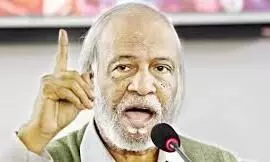
BNP leader Abdul Moyeen Khan criticizes India’s Bangladesh policy
text_fieldsIn a significant critique of India's foreign policy, Abdul Moyeen Khan, a senior leader of Bangladesh’s opposition Bangladesh Nationalist Party (BNP) and former Cabinet minister, has called for an immediate reassessment of India’s approach to Bangladesh.
Speaking to The Indian Express in Dhaka, Khan described India’s decision to closely align with Prime Minister Sheikh Hasina’s government as a “massive policy blunder.”
Khan emphasized that India’s focus on a government-to-government relationship with Hasina’s Awami League, rather than fostering ties between the people of the two nations, was shortsighted. With Hasina now ousted, he argued that India needs to recalibrate its strategy in this "hour of crisis," urging a renewed focus on broader security and strategic interests.
Reflecting on the recent political upheaval in Bangladesh, Khan was critical of Hasina’s governance, accusing her of converting the republic into an oligarchy by controlling key institutions such as the civil administration, judiciary, and media. He noted that the public’s discontent culminated in mass protests, particularly among students, who took to the streets in large numbers.
Regarding the possibility of Hasina’s extradition, Khan expressed skepticism. He highlighted that extradition treaties might not apply to political asylum seekers and pointed out that India had not yet clarified the terms under which Hasina is currently residing in the country. He also suggested that the Indian government would be cautious about any formal requests for her return, given the complex political context.
Khan dismissed the notion that Bangladesh could shift towards pro-Pakistan sentiments, asserting that while Bangladesh would maintain normal relations with all countries, it would never be pro-Pakistan. He also downplayed the influence of Jamaat-e-Islami, describing it as a “paper tiger” and emphasizing that the BNP’s past alliances with Jamaat were purely tactical.
On the role of the interim government and the military in Bangladesh, Khan acknowledged the army's dominance but praised Nobel laureate Muhammad Yunus, who is leading the interim administration, for his independence and ability to assert authority over the military. He expressed hope that the interim government would steer the country back to democracy, despite the challenges of reforming entrenched institutions.
Khan stressed the need for a policy shift in New Delhi, advocating for a broader and more inclusive approach to India-Bangladesh relations. He warned that continued support for Hasina, under current circumstances, could strain the historically strong ties between the two nations.























